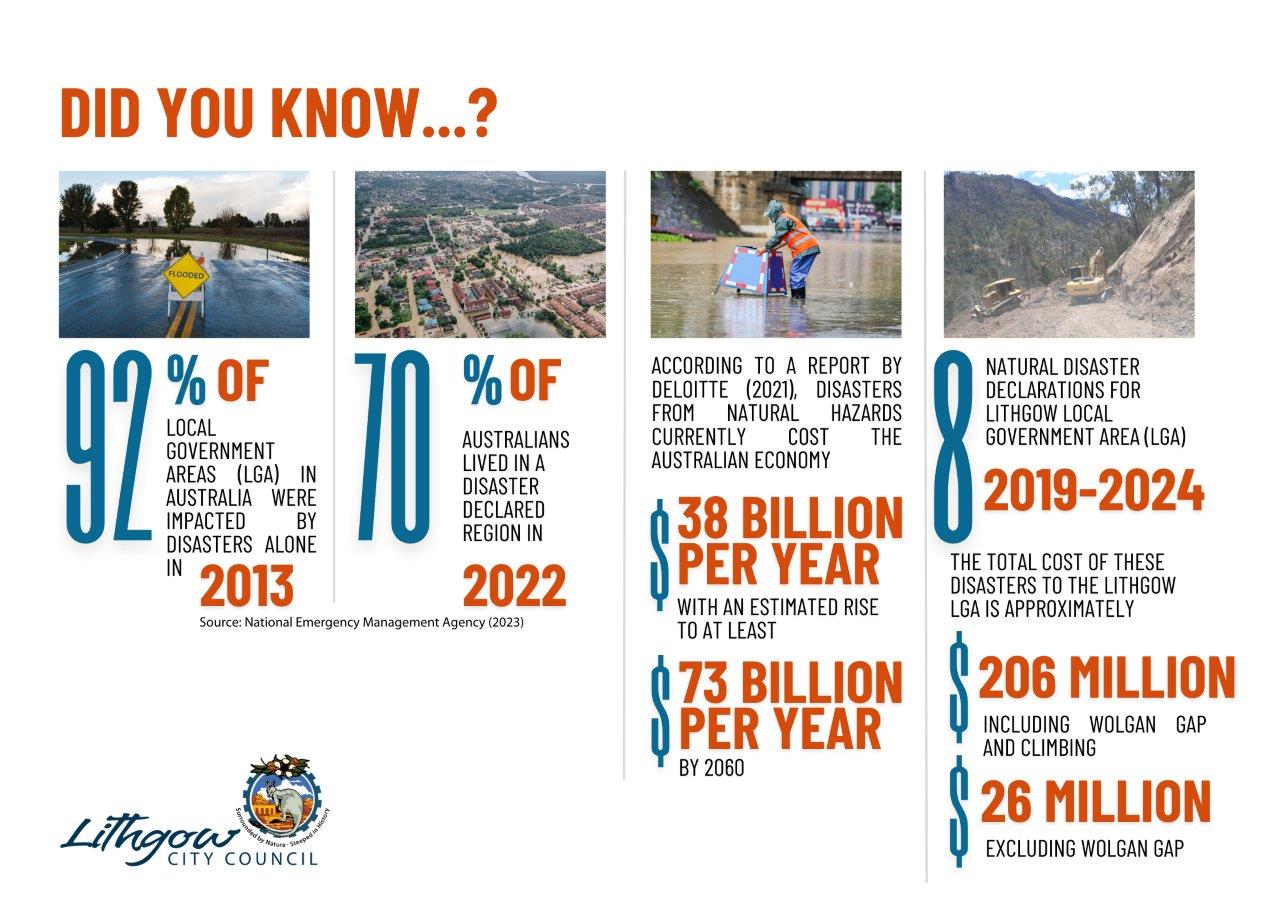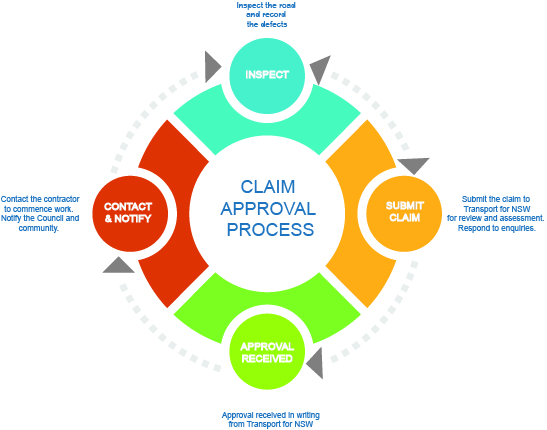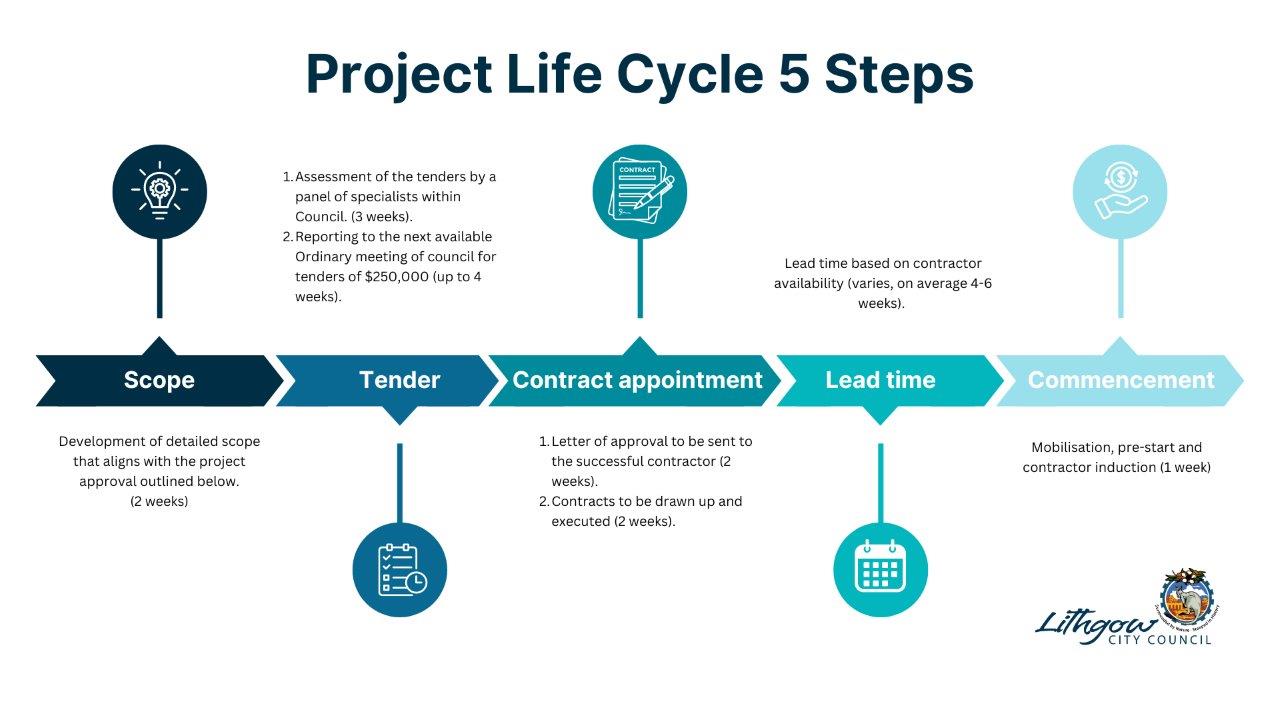Disaster Recovery Projects
Disaster Recovery Projects
In recent years following the Gospers Mountain Megafire and significant rain events, the Lithgow local government area experienced 8 separate disaster events.
Importantly, one should not consider the impacts of these seven events in isolation.
If an LGA experiences one natural disaster, assets are weakened and damaged as a result. If, before there is an opportunity to repair that asset, a second natural disaster impacts that same area, the damage caused is compounded by the impacts of that previous disaster. Now consider that seven of these disasters occur over a very short period – there is no doubt that Lithgow has suffered most severely because of these cumulative, compounding impacts.
This is an unprecedented situation that Lithgow’s assets were not built to withstand. The impacts of climate change can now no longer be ignored though, Lithgow’s future is likely to be characterised by similar future events.
During 2022 average annual rainfall in the Lithgow area was over 170% of historic levels. This culminated in an average monthly rainfall in July 2022 of 400%. This level of rainfall on top of rising water tables caused the breakup of the road surface and potholes on many of the roads throughout the LGA in the second half of 2022.

FAQs
What does this mean?
Because these events have been declared as disasters by the other levels of government, they qualify for funding assistance. Government guidelines require the Council to undertake and fund the works and then claim those funds back. Regional and rural councils, like Lithgow, have very limited financial capacity. The councils do not have the ability to carry large outflows of funds for disaster recovery works, without income from the government being received to offset this. As result, road repairs and other works must be phased, meaning the community’s recovery from the effects of disasters is delayed longer.
The reality is that claims are being submitted by Councils faster than Transport for NSW can assess them. However, Lithgow City Council continues to vigorously pursue and submit claims on behalf of the community in order to progress works.
What is the claim approval process?
A significant amount of work goes into these applications. Every defect must be individually identified, photographed and uniquely registered, and included in the claim alongside a cause, treatment identification and justified cost. In some cases, these applications have hundreds of individual lines that are itemised by defect.
Broadly, the process for each application is as follows.
- Each road is inspected, and defects are identified and given an item number.
- Each item is measured, photographed (several photographs for each item) and entered a claim form.
- A detailed failure cause and treatment scope must be identified per defect.
- The claim for each road can amount to hundreds of items and over a thousand photographs.
- Transport for NSW (TfNSW) then review the claim and may ask for clarification on particular items.
- LCC then respond to TfNSW enquires. This step of the process may have several iterations.
- Once TfNSW are satisfied that all relevant details/information has been provided the claim is approved and council can begin the process of rehabilitating the road.

Once the claim is approved how long will it take before works commence?
Once the claim is approved, Council must follow legislated procurement procedures to identify suitable contractors to undertake works. For some projects, like Glen Davis Road, this has been previously completed. Once the Council has been advised in writing that the claim has been approved, the Contractor for that area will be contacted to ascertain when they are available to commence the works. All contractors are currently engaged, and commencement of works is dependent upon Contractor availability.
For other projects, procurement must follow the following process:

Project Life Cycle
- Development of detailed scope that aligns with the project approval outlined above. (2 weeks)
- Public exhibition by open tender (4 weeks minimum).
- Assessment of the tenders by a panel of specialists within Council. (3 weeks)
- Reporting to the next available public meeting of Council for tenders over the $250,000 threshold (this captures most projects). (up to 4 weeks)
- Letter of approval to be sent to the successful contractor. (2 weeks)
- Contracts to be drawn up and executed. (2 weeks)
- Lead time based on contractor availability (varies, on average 4 – 6 weeks)
- Mobilisation, pre-start and contractor induction. (1 week)
What happens if a claim is not approved?
If a claim is not approved, Council must argue the claim and further support the engineering basis for works. In the worst-case scenario, Council must identify alternative sources of funding to complete the work.
Media releases
$33 million Disaster Recovery Funding Welcomed for Lithgow
Mayor Maree Statham Discusses Disaster Recovery for Roads with Regional Transport Minister
Advocating for a better model of funding for Disaster Recovery Works
Calling for Disaster Recovery Funding to be provided upfront
Mayor Meets with Premier and Senior Ministers
Mayor attends meetings with Mayors and Federal Government Ministers
| Road | Description / location of works | Number of defect items | Progress |
|---|---|---|---|
| Wolgan Gap - New Road | Construction of a new road to replace the failed 2.6 km section of Wolgan Road. The new road section will be situated on the eastern escarpment of Wolgan Gap. | NA | Wolgan Valley Disaster Response |
| Browns Gap Road (Landslide) Stage 1 | Hassans Walls Road to Hartley Vale Road | NA | Browns Gap Road Works |
| Browns Gap Road (Landslide) Stage 2 | Hassans Walls Road to Hartley Vale Road | NA | |
| Browns Gap Road, Hartley Valley | Great Western Highway to Blackmans Creek Road | Tba | Phase: Start: Expected completion: Progress |
| Blackheath Creek Road, Hartley Valley | Cox's River Road to Mill Creek Road | 95 | Phase: Claim submitted Start: Expected completion: Progress |
| Cooerwull Road, Bowenfels | Great Western Highway to Fullagar Avenue | Tba | Phase: Start: Expected completion: Progress |
| Dark Corner Road, Dark Corner | Cupitts Lane to Wattle Creek Road | 44 | Phase: Submitted 4 June 2024 Start: Expected completion: Progress |
| Glen Alice Road, Glen Alice | Glen Davis Road to Mt Marsden | 146 | Phase: Claim submitted Start: Expected completion: Progress |
| Glen Davis Road, Glen Davis | Castlereagh Highway to Glen Alice Road | 105 | Phase: Funding approved Start: 8 April 2024, between 7am & 5pm. Expected completion: 12 Weeks (weather permitting) Progress The works will include repairs to the road surface, reinstatement of the road edges where needed and clearing of roadside drainage where required. Motorists are advised that traffic control will be in place and to expected minor delays as lanes may be closed for works. However, the road will remain open. |
| Fields Road, Hartley Valley | Browns Gap Road to Hartley Vale Road | 12 | Phase: Claim submitted Start: Expected completion: Progress |
| Hampton Road, Rydal/Hampton | Sydney Road to Jenolan Caves Road | Tba | Phase: Start: Expected completion: Progress |
| Hartley Vale Road, Hartley Valley | Browns Gap Road to LGA Boundary | Tba | Phase: Start: Expected completion: Progress |
| John Mackey Drive, Portland | Pipers Flat Road to Portland-Sunny Corner Road | 14 | Phase: Claim submitted Start: Expected completion: Progress |
| Lowther Siding Road, Lowther | Jenolan Caves Road to Ganbenang Road | 76 | Phase: Claim submitted Start: Expected completion: Progress |
| Magpie Hollow Road, South Bowenfels | Great Western Highway to Rydal-Hampton Road | 89 | Phase: Claim submitted Start: Expected completion: Progress |
| Marsden Swamp (Landslide) | Land Slip | NA | Phase: submitted 21/06/2023 Start: Expected completion: Progress: 7/6/24 Consultants have been engaged to provide a geotechnical report for the land slip. |
| Mid Hartley Road, Hartley Valley | Browns Gap Road to Great western highway | 34 | Phase: Claim submitted Start: Expected completion: Progress |
| Old Bathurst Road, South Bowenfels | Land Slip | NA | Phase: Start: Expected completion: Progress |
| Pipers Flat Road, Portland | Rydal Road to John Mackey Drive | 35 | Phase: Claim submitted Start: Expected completion: Progress |
| Portland-Sunny corner Road, Portland | Sloggetts Lane to Sunny Corner Road | 129 | Phase: Claim submitted Start: Expected completion: Progress |
| Sir Thomas Mitchell Drive, South Bowenfels | Land Slip | NA | Phase: Start: Expected completion: Progress |
| Sodwalls Road, Sodwalls | Tarana to Rydal-Hampton Road | 190 | Phase: claim submitted Start: Expected completion: Progress |
| Wolgan Road (2), Wolgan Valley | Donkey Steps to Barton Creek Bridge | 82 | Phase: Claim submitted Start: Expected completion: Progress |
| Wolgan Road (1), Lidsdale | Maddocks Lane to Council Tip | 47 | Phase: Claim submitted Start: Expected completion: Progress |
| Range Road | From Pipers Flat Road to Great Western Hwy | 142 | Phase: Claim submitted 30/1/2024 Start: Expected completion: Progress: |